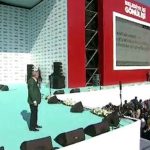Nobody expected the contestants in the upcoming March 31 local elections to play fair, but Monday’s front pages showed just how divisive a campaign the ruling Justice and Development Party (AKP) has chosen to run.
The fact is that thousands of women attended a march in Istanbul for International Women’s Day on March 8 and spent hours on or near Taksim Square in the city centre, where they were confronted by police blocking the route of the march.
At one point, videos captured the Muslim call to prayer, or “ezan” sounding, and at the same time women in the crowd whistles of protest can be heard from the women on the march.
Turkish President Recep Tayyip Erdoğan has played footage of the march at rallies, telling voters the women had purposefully disrespected the call to prayer and stating that the women marchers were representative of opposition parties, making it a “matter of honour” to defeat them in the elections.
The pro-government press happily obliged the president on Monday, with 10 national newspapers running front-page stories on the “enemies of the ezan”.
Left-wing daily Sözcü’s front page delved into the unfair advantage the AKP’s control of Turkey’s media gives it, listing the amount of coverage given to party leaders on Turkey’s supposedly impartial national broadcaster, TRT.
While Erdoğan had been given 50 hours of coverage on TRT at the time of writing, all of it favourable, the main opposition Republican People’s Party (CHP)’s leader, Kemal Kılıçdaroğlu, had been given 11-and-a-half hours, six unfavourable.
Likewise, Erdoğan’s alliance partner, far-right Nationalist Movement Party (MHP) leader Devlet Bahçeli, had received over three hours of favourable coverage, whereas Kılıçdaroğlu’s alliance partner, centre-right Good Party leader Meral Akşener, received 55 minutes of favourable and 70 minutes of unfavourable coverage.
On Tuesday the CHP’s mayoral candidate for Ankara, Mansur Yavaş, became the subject of fierce controversy after a criminal complaint was filed against him alleging that he had abused his office while working as a lawyer a decade ago to commit fraud.
Sözcü and secularist daily Cumhuriyet were sceptical of the story, pointing out that the timing of the indictment was meaningful given that Yavaş is by some counts the frontrunner in the race for the capital city.
The case against Savaş was not the only attack on opposition parties to hit front pages on Tuesday.
Pro-government daily Akşam was one of several newspapers that devoted their headline stories to accusing CHP deputy Aysu Bankoğlu of asking members of the outlawed Kurdistan Workers’ Party (PKK) for their votes.
Turkey lists the PKK as a terrorist organisation due to its history of armed struggle for Kurdish self-rule in Turkey, and the ruling party has used its links to the Kurdish political movement to smear both the pro-Kurdish Peoples’ Democratic Party (HDP) and opposition parties that look to collaborate with the HDP.
Bankoğlu said during a conference in Germany that her party would look to serve voters in Turkey without looking at whether or not they are PKK members. Prosecutors have opened a case against her, saying the comments amount to support for the PKK, but Bankoğlu says they have been taken out of context.
Pro-government daily Türkiye kept up the sustained attack on the opposition on Wednesday, devoting its front page to a speech by Erdoğan in which the president urged voters to “destroy the alliance with terrorism,” referring to the CHP’s electoral alliance with the centre-right nationalist Good Party.
The CHP has also informally made informal agreements in certain constituencies with the HDP, and the ruling party has seized on this, making allusions to support for terrorism a central part of its campaign strategy.
The left-wing nationalist newspaper Aydınlık joined in the attack, condemning the CHP for refusing to boot out politicians it said sided with the Kurdish political movement.
Aydınlık is the press organ for the anti-imperialist nationalist Patriotic Party, a small but influential political party with left-wing roots that strongly opposes the Kurdish political movement.
Pro-government newspapers continued slinging mud at the opposition on Thursday. Akşam led with a headline accusing the CHP of “carrying municipalities to Qandil,” referring to the mountain range in northern Iraq known as a PKK stronghold.
The front-page story echoed the words of Erdoğan on one of his many pre-election rallies, as did Türkiye’s.
Cumhuriyet’s front page gave one possible explanation for the ruling party’s frenzied efforts to demonise the opposition and cast the local elections as a matter of survival: the economy.
The newspaper quoted economists as saying the Turkish economy, which went into recession in the last quarter, has not showed signs of recuperating any time soon, meaning the likelihood of applying to the International Monetary Fund for support is on the rise.
Sözcü, meanwhile, expressed a wish for a more genteel style of politics in Turkey on a front page that compared Good Party leader Meral Akşener’s statements in the run-up to March 31 to those of Erdoğan and Devlet Bahçeli, the leader of the far-right Nationalist Movement Party (MHP), the AKP’s electoral alliance partner.
While Sözcü led with Akşener’s declaration that all “who give their votes to the AKP and MHP are our brothers and sisters,” it contrasted this with the president’s declaration that the CHP was running mayoral candidates from the Gülen organisation, an outlawed religious movement that Ankara holds responsible for the July 2016 coup attempt.
On Friday, three pro-government dailies took a break from bashing the opposition to laud the AKP’s efforts developing Turkey’s healthcare system. The occasion was the opening of a new state hospital in Ankara, which Yeni Şafak said has the capacity to treat 30,000 patients per week.
Sözcü’s front page attacked the AKP government’s agricultural policies, which have long been a source of concern for Turks but became a subject of intense scrutiny late last year when food price inflation brought prices of staple foods to levels usually reserved for luxury items.
Faulty policies had meant that potatoes, which had been exported two-and-a-half months ago for 63 Turkish cents ($0.11) a kilo, are now on sale domestically for 3 lira ($0.55) per kilo.
Left-wing daily BirGün’s front page painted a bleak picture of the economy with news that there have been 178,000 for unemployment benefits, a trend that an economist quoted by the newspaper said could lead to record-breaking levels of unemployment.
On Friday the world was dismayed when a white supremacist carried out a terrorist attack on two mosques in Christchurch, New Zealand, killing 49 people.
The attacker’s manifesto included a section titled “to turks”, and it included threats against Erdoğan and calls for “Christians” to take Istanbul and the European parts of Turkey.
The gunman’s manifesto fit in with the AKP’s pre-election rhetoric warning Turks they were in danger from “global terrorists”, and by Friday evening Erdoğan had tied the attack to the local elections in campaign speeches, imploring Turks to “send a message to the enemies of Turkey and Islam on March 31”.
Turkish television channels broadcast footage from the attack, which the gunman filmed using a head-mounted camera and live streamed on his Facebook page. A large section of the media followed suit on Saturday, with the largest pro-government outlets running front-page headlines containing the phrase “crusader terrorism”.
Source: ahval News



